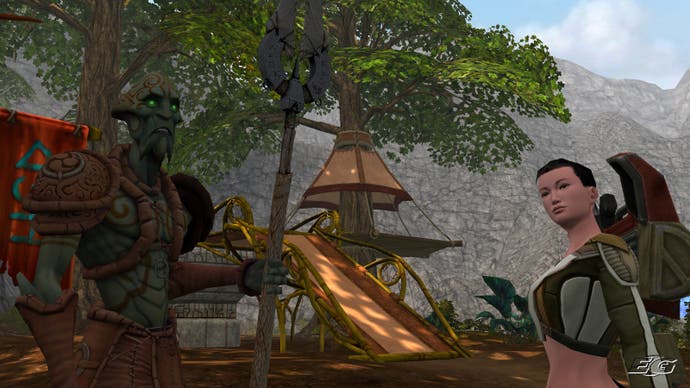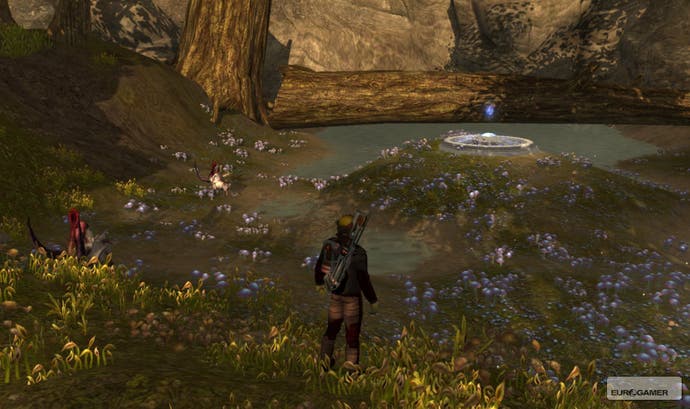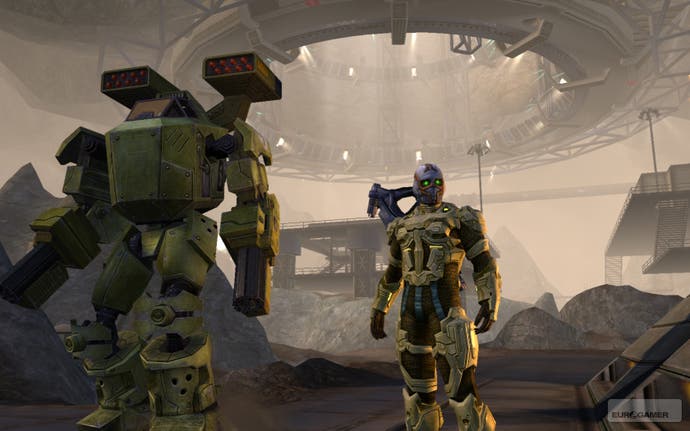Tabula Rasa
British Steel.
Aliens, a fairly sincere voice-over informs us, have invaded Earth and made a right bloody mess. But it's okay, because now we're bringing the fight to them, and kicking their scaly, leathery, vaguely insectoid backsides across exotic plants around the galaxy. Would you like to know more?
Right down to the hints of influence from propaganda film-making in its presentation, Richard Garriott's return to the massively multiplayer genre is a dead ringer for Starship Troopers. It's unapologetically militaristic, ultra-violent and filled with intense action scenes, yet below the surface there's a keen intelligence at work that's easy to miss at the first glance. No naked shower scenes, granted; but yes, we'd like to know more.
Join the Mobile Infantry and save the world
It's been ten years since Garriott released Ultima Online, and Tabula Rasa is proof positive that he hasn't been sitting on his hands in that time. A hell of a lot has changed in the last decade. 3D graphics have matured, the Internet has become faster, multiplayer games have exploded past the boundaries of the early-twenties geek demographic, and user interfaces have been reinvented and refined countless times. In the face of such change, it would be easy for Tabula Rasa to be a big fat anachronism.

It isn't - or rather, if Tabula Rasa is an anachronism, it's because it belongs in part to tomorrow, rather than to yesterday. Which isn't to put our foot down and say that this is, in any definitive way, "the future of massively multiplayer games", but rather that there are certainly moments when it feels quite unlike anything you've ever played before. In the massively multiplayer space, filled as it is with little, picky innovations that never actually scratch the surface of how the genre works, that makes it into a rare gem.
The most blatant, balls-out, dare to be different thing about Tabula Rasa is also the one which is going to raise the hackles of traditional MMO players the most. This is a game where, like an action game, you move around with the keyboard and aim with the mouse. You actually need to target things if you want to hit them (to some extent, at least); then you fire your weapon with the left mouse button, or trigger your selected ability with the right mouse button.
MMO aficionados may have spotted the dilemma already. If all this functionality is on your mouse, how do you move the cursor around? How do you select items, muck around in your inventory, or any of that sort of crucial MMORPG stuff? Simple answer: you don't. Calling up your inventory, your skills page or your quest log activates the mouse cursor (you can also do this with the Control key, which gives you a handy radial menu around the cursor), but deactivates your aiming, and your ability to shoot things, into the bargain. If you want to commit suicide on the battlefield, there's no easier way of doing it.
In itself, that's a hint. Tabula Rasa is fast-paced and furious. A bad situation in a battle - or a slow reaction to a new enemy or powerful attack - will leave you leaking squishy bits out through your tattered armour faster than almost any other MMORPG we've ever played. This isn't a game where you screw with your inventory mid-fight; you stick the stuff you're going to need into your quickslots, make sure all your weapons are reloaded, and then go in all guns blazing. It's a massively multiplayer game for twitchy FPS lead-heads who have developed a thousand yard stare from watching too many clanmates die horribly in Counter-Strike.

Those used to the slower and more considered pace of traditional fantasy MMORPGs should be recoiling in horror right about now, and rightly so. The genre hasn't always been plodding, by any means - anyone who has done high-level raid instances in a game like World of Warcraft can tell you how fast your reactions need to be at times. However, you've always been removed from the combat a little by an interface which was more akin to issuing commands than actually fighting. Tabula Rasa takes away that safety net, and not everyone is going to like it - but plenty of people, we think, are going to love it.
Service Guarantees Citizenship
It would be disingenuous, however, to suggest that Tabula Rasa is taking the RPG out of MMORPG. You may be aiming and firing guns in this game, but every shot you take is still the subject of a dice roll behind the scenes - working out whether you hit, what damage you caused, and so on. The aiming isn't particularly arduous, either, and the game keeps you locked on to targets even when they wander quite a long way out of your crosshairs.
However, there are new values being considered here in the dice roll equation - how far away your target is, whether it's behind cover, whether you're crouching or standing up, how long you've been locked onto it, whether you're facing an exposed or an armoured part. These enhance the strategy of movement, of positioning and of aiming in a way which MMORPGs have previously ignored, for the most part, even if they don't change the fact that underlying the whole thing is the same stat-based digital Top Trumps game which goes on behind the curtain of every MMO world.

Tabula Rasa's creator practically invented the rules of that stat game, and he's still a dab hand at implementing them. The game's character progression system is deceptive in its simplicity, and glorious in its flexibility. Taking its cues from Korean games (a nod, perhaps, to publisher NCsoft's heritage), it starts every player out as a Recruit - an undifferentiated character for whom you choose gender and appearance, but nothing else. As you move through the game, you'll hit branches at certain levels which allow you to choose how you wish to progress; characters divide into two branches at level 5 (Soldier, a general warrior class, and Specialist, a general support class), before subdividing into four and subsequently eight classes further on in the game.
It's a brilliant system, giving players plenty of time to experiment with different play styles before choosing their path - and it's made even better by Tabula Rasa's Cloning mechanism, which awards you credits with which to make clones of your existing character. You pick a new name and appearance, and a character is created at the same level as your existing character, but with no skill points allocated - allowing you to try new configurations, or to go off down a different class pathway without having to play through early content again. By making a clone before you make every major decision in the class tree, you effectively give yourself a chance to try each profession without grinding through the same levels all over again - a brave, innovative and wonderful piece of design.



